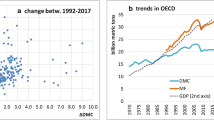Abstract
Innovation is increasingly recognised as an alternative for poverty alleviation in developing countries. However, cases of innovation in small producers’ clusters in Vietnam imply negative externalities that conflict with today’s notions of sustainable and inclusive development. This article analyses how small producers innovate while taking environmental and social considerations into account through an interactive societal process towards a community network, conceptualised as responsible innovation. Existing multifaceted theoretical insights do not provide sufficient basis to construct and test explanations. We apply a grounded theory involving Actor-Network Theory (ANT) to seek explanations as to why some small producers behave opportunistically while others acknowledge responsibility for the negative externalities. ANT enables us to see the critical details of the network creation process, including the agenda of the key actors, push and pull factors, the type of innovation, and the informal institutional context.
Abstract
L’innovation est de plus en plus reconnue comme une alternative pour le soulagement de la pauvreté dans les pays en développement. Cependant, des cas d’innovation chez des petits groupes de producteurs au Vietnam ont eu des externalités négatives qui sont en conflit avec les notions contemporaines de développement inclusif et durable. Cet article analyse comment des petits producteurs ont réussi à innover tout en tenant en compte facteurs sociales et environnementales, à travers un procès sociale interactif qui les a amené à construire un réseau communautaire – ce qu’on conceptualise comme de la innovation responsable. Les aperçus multidisciplinaires courants n’offrent assez de bases pour construire et tester des explications. Nous avons donc applique Actor-Network Theory (La Théorie de l’Acteur – Réseau; ANT) pour expliquer pourquoi des petits producteurs agissent de forme opportuniste, pendant que d’autres prennent responsabilité pour les externalités négatives. L’ANT nous permet de voir les détails critiques de la création du réseau, y inclus l’agenda des acteurs principales, les facteurs qui font avancer et ceux qui trainent, le type d’innovation, et le contexte institutionnel informel.

Similar content being viewed by others
Notes
Kaplinsky and Morris (2001) identified various types of innovation: (i) process innovation, aiming at improving the efficiency of transforming inputs into outputs; (ii) product innovation, leading to better quality, lower price and/or more differentiated products; (iii) business practice innovation, implying new ways of doing business and attracting new clients; (iv) functional innovations – assuming responsibility for new activities in the value chain, such as design, marketing and logistics; and (v) inter-chain innovations moving to new and profitable chains.
References
Beers, P., Sol, J. and Wals, A. (2010) Social learning in a multi-actor innovation context. Paper presented at the Ninth European IFSA Symposium ‘Building Sustainable Rural Futures – The Added Value of Systems Approaches in Times of Change and Uncertainty’, 4–7 July, Vienna, Austria.
Bourdieu, P. (1985) The forms of capital. In: J.G. Richardson (ed.) Handbook of Theory and Research for the Sociology of Education. New York: Greenwood, pp. 241–258.
Boyer, R. (2005) How and why capitalisms differ. Economy and Society 34 (4): 509–557.
Callon, M. (1986) Some elements of a sociology of translation: Domestication of the scallops and the fishermen of St Brieuc Bay. In: J. Law (ed.) Power, Action and Belief: A New Sociology of Knowledge. London: Routledge and Paul Kegan, pp. 196–223.
Clarke, S. and Roome, N. (1995) Managing for environmentally sensitive technology: Networks of collaboration and learning. Technology Analysis and Strategic Management 7 (2): 191–215.
Dessler, D. (1999) Constructivism within a positivist social science. Review of International Studies 25 (1): 123–137.
Devitt, M. (1997) Realism and Truth. Princeton, NJ: Princeton University Press.
Dosi, G. (1988) The nature of the innovation process. In: G. Dosi, C. Freeman, R. Nelson, G. Silverberg and L. Soete (eds.) Technical Change and Economic Theory. Chapter 10 London: Pinter Publishers.
Edquist, C. (1997) Systems of Innovation: Technologies, Institutions and Organisations. London: Pinter Publishers.
Frederick, W.C. (1960) The growing concern over business responsibility. California Management Review 2 (4): 54–61.
Freeman, C. (1995) The national system of innovation in historical perspective. Cambridge Journal of Economics 19 (1): 5–24.
Gereffi, G., Humphrey, J. and Sturgeon, T. (2005) The governance of global value chains. Review of International Political Economy 12 (1): 78–104.
Gereffi, G. and Korzeniewicz, M. (eds.) (1994) Commodity Chains and Global Capitalism. Westport, CT: Praeger.
George, G., McGahan, A. and Prabhu, J. (2012) Innovation for inclusive growth: Towards a theoretical framework and a research agenda. Journal of Management Studies 49 (4): 661–683.
Glancey, K., Greig, M. and Pettigrew, M. (1998) Entrepreneurial dynamics in small business service firms. International Journal of Entrepreneurial Behaviour & Research 4 (3): 249–268.
Glaser, B. and Strauss, A. (1967) The Discovery of Grounded Theory: Strategies for Qualitative Research. Chicago, IL: Aldine Publishing Company.
Granovetter, M. (1992) Problems of explanation in economic sociology. In: N. Nohria and R.G. Eccles (eds.) Networks and Organizations. Boston, MA: Harvard Business School Press, pp. 25–56.
Hart, S. (2007) Capitalism at the Crossroads: The Unlimited Business Opportunities in Solving the World’s Most Difficult Problems. Upper Saddle River, NJ: Wharton School Publishing.
Humphrey, J. and Schmitz, H. (1996) Trust and economic development. IDS Discussion Paper No. 355. Brighton: Institute of Development Studies (IDS), University of Sussex.
Kaplinsky, R. and Morris, M. (2001) A Handbook for Value Chain Research. Brighton, UK: Institute of Development Studies (IDS), University of Sussex.
Kline, S.J. and Rosenberg, N. (1986) An overview of innovation. In: R. Landau and N. Rosenberg (eds.) The Positive Sum Strategy: Harnessing Technology for Economic Growth. Washington DC: National Academies Press, pp. 275–305.
Kolb, D. (1984) Experiential Learning. Englewood Cliffs, NJ: Prentice Hall.
Krugman, P. (1991) Increasing returns and economic geography. Journal of Political Economy 99 (3): 483–499.
Latour, B. (1987) Science in Action: How to Follow Scientists and Engineers through Society. Milton Keynes, UK: Open University Press.
Law, J. (1992) Notes on the theory of the actor-network: Ordering, strategy and heterogeneity. Systems Practice 5 (4): 379–393.
Leeuwis, C. and Van den Ban, A. (2004) Communication for Rural Innovation: Rethinking Agricultural Extension. London: Blackwell Science.
Lundvall, B.-Å. (1992) National Systems of Innovation: Towards a Theory of Innovation and Interactive Learning. London: Pinter Publishers.
Lundvall, B.-Å., Joseph, K., Chaminade, C. and Vang, J. (2009) Handbook of Innovation Systems and Developing Countries – Building Domestic Capabilities in a Global Setting. Cheltenham, UK: Edward Elgar.
Marshall, A. (1925) The Principles of Economics. New York: Palgrave Macmillan.
McCann, P. (1995) Rethinking the economics of location and agglomeration. Urban Studies 32 (3): 563–577.
Mytelka, L. and Smith, K. (2001) Innovation theory and innovation policy: Bridging the gap. Paper presented on Nelson and Winter DRUID Conference, 12–15 June, Aalborg.
Nelson, R. and Winter, S. (1977) In search of a useful theory of innovation. Research Policy 6 (1): 36–76.
Nelson, R. and Winter, S. (1982) An Evolutionary Theory of Economic Change. Cambridge, UK: Bellknap Press.
North, D.C. (1990) Institutions, Institutional Change and Economic Performance. New York: Cambridge University Press.
Putnam, R. (2000) Bowling Alone: The Collapse and Revival of American Community. New York: Simon and Schuster.
Porter, M. E. (1990) The Competitive Advantage of Nations. London: Palgrave Macmillan.
Raiser, M., Rousso, A. and Steves, F. (2008) Trust in transition: Cross-country and firm evidence. Journal of Law, Economics and Organization 24 (2): 407–433.
Rogers, E. (1962) Diffusion of Innovations. New York: Free Press.
Rutten, R. and Boekema, F. (2007) The Learning Region: Foundations, State of the Art, Future. Cheltenham, UK: Edward Elgar.
Stoker, G. (1998) Governance as theory: Five propositions. International Social Science Journal 50 (155): 17–28.
Van Dyne, L. and Pierce, J. (2004) Psychological ownership and feelings of possession: Three field studies predicting employee attitudes and organizational citizenship behavior. Journal of Organizational Behavior 25 (4): 439–459.
Voeten, J., De Haan, J. and De Groot, G. (2011) Is that innovation? Assessing examples of revitalized economic dynamics among clusters of small producers in northern Vietnam. In: A. Szirmai, W. Naudé and M. Goedhuys (eds.) Entrepreneurship, Innovation, and Economic Development. Oxford: Oxford University Press, pp. 96–121.
Voeten, J., Roome, N., De Groot, G. and De Haan, J. (2012) Resolving environmental and social conflicts – Responsible innovation in small producers’ clusters in northern Vietnam. In: A. Lindgreen, P. Kotler, J. Vanhamme and F. Maon (eds.) A Stakeholder Approach to Corporate Social Responsibility: Pressures, Conflicts, Reconciliation. Aldershot, UK: Gower Publishing, pp. 243–261.
Williamson, O. (1986) The Economic Institutions of Capitalism. New York: Free Press.
World Bank (2000) World Development Report 2000/2001 – Attacking Poverty: Opportunity, Empowerment, and Security. Washington DC: World Bank Publications.
Author information
Authors and Affiliations
Corresponding author
Appendix
Appendix
The societal process towards acknowledging responsibility.
Note: A community may accept the perceived harmful societal outcomes as a trade-off for the economic benefits. If not, the model suggests that a (latent) conflict will emerge between innovators and actors who feel insufficiently compensated. Innovators can acknowledge their responsibility and modify their innovation, which is a form of internal regulation, or they can deny responsibility and take an opportunistic attitude resulting in an escalating conflict. Then the external regulation is required by a third-party intervention.
Source: Voeten et al (2012).
Rights and permissions
About this article
Cite this article
Voeten, J., Haan, J., Groot, G. et al. Understanding Responsible Innovation in Small Producers’ Clusters in Vietnam through Actor-Network Theory. Eur J Dev Res 27, 289–307 (2015). https://doi.org/10.1057/ejdr.2014.35
Published:
Issue Date:
DOI: https://doi.org/10.1057/ejdr.2014.35





